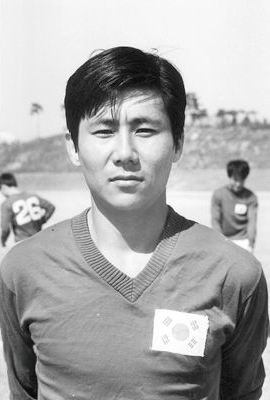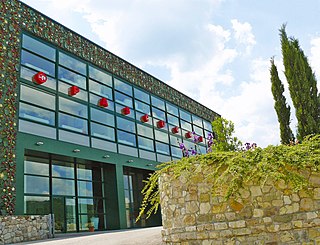| |||||
| Centuries: | |||||
|---|---|---|---|---|---|
| Decades: | |||||
| See also: | Other events in 1963 Years in South Korea Timeline of Korean history 1963 in North Korea | ||||
Events from the year 1963 in South Korea .
| |||||
| Centuries: | |||||
|---|---|---|---|---|---|
| Decades: | |||||
| See also: | Other events in 1963 Years in South Korea Timeline of Korean history 1963 in North Korea | ||||
Events from the year 1963 in South Korea .

South Korea, officially the Republic of Korea (ROK), is a country in East Asia. It constitutes the southern half of the Korean Peninsula and borders North Korea along the Korean Demilitarized Zone. The country's western border is formed by the Yellow Sea, while its eastern border is defined by the Sea of Japan. Like North Korea, South Korea claims to be the sole legitimate government of the entire peninsula and adjacent islands. It has a population of 51.96 million, of which half live in the Seoul Metropolitan Area, the ninth most populous metropolitan area in the world. Other major cities include Busan, Daegu, and Incheon.

The president of the Republic of Korea, also known as the president of Korea, is both the head of state and head of government of the Republic of Korea. The president is directly elected by the citizens of the Republic of Korea and pledges to execute the duties of their office, chief among others "to defend the State, pursue peaceful unification of the homeland." The president leads the State Council, is the chief of the executive branch of the national government and the commander-in-chief of the Republic of Korea Armed Forces.

Dongducheon is a city in Gyeonggi Province, South Korea.

The Third Republic of Korea was the government of South Korea from December 1963 to November 1972. The Third Republic was founded on the dissolution of the Supreme Council for National Reconstruction that overthrew the Second Republic and established a military government in May 1961. Park Chung Hee, the Chairman of the Supreme Council, was elected President of South Korea in the 1963 presidential election.

A series of campaigns were conducted between 1231 and 1270 by the Mongol Empire against the Goryeo dynasty of Korea. There were seven major campaigns at tremendous cost to civilian lives, the last campaign made most of Goryeo a vassal state of the Yuan dynasty for approximately 80 years. However, rebellion movements existed throughout this time and in 1274, some Goryeo territory existed outside of Mongol control.

The Busan Cooperative Fish Market is the largest fish market in South Korea. It adjoins the South Harbor in Busan. More than 30% of the country's fish production passes through the market. In recent years, a large percentage of the catch has been made up of yellowtail, due to warming waters in the Sea of Japan. The market occupies an area of 166,420 m2, of which about 10% is a refrigerated working area.

Kim Jung-nam is a South Korean former football player and manager.
DNA Motor is a South Korean motorcycle, motorscooter and ATV manufacturer. It produces over 300,000 vehicles a year since production started in 1963. Daelim's products are popular in Germany, Spain, United Kingdom, Australia, France, Italy, Israel, Rwanda, Yemen and Sudan.
Jiao Zhimin is a Chinese-born naturalised-South Korean former table tennis player. She won a bronze medal in women's singles and a silver medal in women's doubles at the 1988 Seoul Olympic Games. She was a semi-finalist in women's singles and doubles at the 1985 World Championships in Gothenburg. At the 1987 World Championships in New Delhi she was runner-up in the mixed doubles, and was a member of China's victorious team.

South Korea–Switzerland relations have been continuous since both countries established diplomatic relations around the end of 1962 and beginning of 1963. South Korea has an embassy in Bern and Switzerland has an embassy in Seoul.
Koh Suk-Chang is a male South Korean former handball player who competed in the 1984 Summer Olympics and in the 1988 Summer Olympics.
The South Korea national under-20 football team represents South Korea in international youth football competitions and also can be managed as under-18 or under-19 team if necessary. South Korean under-20 team won twelve AFC U-20 Asian Cup titles and reached the FIFA U-20 World Cup final once, both are the most successful results among Asian teams.
Cho Min-Kook is a South Korean former footballer and football coach who played for the whole of his career as a defender for Lucky-Goldstar Hwangso and LG Cheetahs. He managed K League Classic side Ulsan Hyundai for the 2014 season.

Rice is a 1963 South Korean drama film directed by Shin Sang-ok. The film was selected as the South Korean entry for the Best Foreign Language Film at the 39th Academy Awards, but was not accepted as a nominee.

Caffè Pascucci is an Italian coffeehouse chain, with branches in over 25 countries.

Brazil–South Korea relations are the diplomatic relations between the Federative Republic of Brazil and the Republic of Korea. Both nations are members of the G20 and the United Nations.
Events from the year 1963 in North Korea.

The national symbols of South Korea are official and unofficial flags, icons, or cultural expressions that are emblematic, representative, or otherwise characteristic of South Korea and of its culture. Since the division of the Korean peninsula in 1948, South Korea has retained traditional symbols to distinguish from the national symbols of North Korea.

The composition of the National Assembly of South Korea is determined by elections every four years.

Choi Tu-son was a South Korean politician who served as the prime minister of South Korea from 17 December 1963 to 9 May 1964.